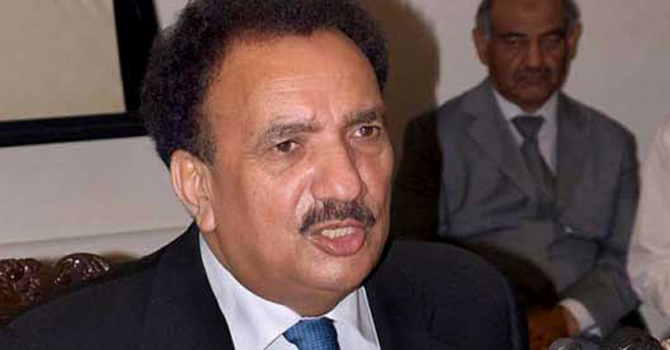
ISLAMABAD: Interior Minister Rehman Malik filed a petition in the Supreme Court on Tuesday seeking review of its ruling which held him dishonest and not sagacious. The filing of the petition coincided with a decision by the Election Commission not to proceed against Mr Malik for submitting a false statement about his foreign nationality.
On Sept 20, the apex court disqualified 11 members of parliament and provincial assemblies and ordered the ECP to initiate legal proceedings against Mr Malik. The short order also required him to reimburse all monetary benefits drawn by him up to July 11, 2012, for the period he occupied the public office.
But the ECP decided on Tuesday not to proceed against Mr Malik after receiving a reference from the Senate Secretariat.
“The Acting Chairman of Senate, Sabir Ali Baloch, has decided the matter under Article 63 (2) of the Constitution and stated that no question of disqualification has arisen. There is no occasion for the commission to proceed with any further,” the reference said.
The deputy chairman mentioned a Supreme Court judgment in the dual nationality case and two disqualification references filed with the Senate Secretariat against Mr Malik -- one by Asif Aizdee on Aug 28 and the other by Maulvi Iqbal Haider on Sept 22.
In his petition, Mr Malik requested the court to review its earlier decision because there were errors on the face of the record.
Drafted by former attorney general Anwar Mansoor, the petition recalled that there was no specific column in the nomination papers which required an applicant to disclose whether he held dual nationality. “The general statement that the applicant is qualified under the Constitution may not be considered to be an untrue statement when the matter of dual citizenship remained in doubt until decided by the apex court,” it said.
Mr Malik denied that he had ever misstated about his foreign citizenship. “The mis-declaration being attributed to him is not only based on error apparent on the face of the record but same is also the result of a mistake of law manifest from the perusal of Article 63 of the Constitution,” he contended.
The dual citizenship, the petition reminded, was permitted by the Pakistan Citizenship Act 1951.
Referring to the court order to repay all emoluments, Mr Malik said he had attended all work in the Senate with commitment and sincerity and put in long hours on different issues in committees and sessions of the upper house. In these circumstances, deprivation of salaries and allowances would mean forced labour not permitted under the Constitution.
Mr Malik said he had filed an application for renouncing his British citizenship through a solicitor and presumed that his renunciation had been finalised.
The petition recalled that although the original application for renunciation endorsed by the UK Border Agency was not available unfortunately at the time when the court had asked for, other evidence of the co-signatory and the solicitor was available with the affidavits of these persons as secondary evidence.
A British passport holder, it said, was not required to obtain a visa to enter Britain. But Mr Malik continued to travel to the UK on a British visa on the Pakistani passport after the date of renouncing his foreign citizenship. This clearly showed that he genuinely believed that his status was not that of a British subject and that he was not holding the nationality of Pakistan and England simultaneously, it said.
The petition regretted that the court proceeded against him on the assumption that whatever he stated was untrue without giving him a fair trial contemplated under Article 10-A of the Constitution. Even under Qanoon-i-Shahadat, secondary evidence could be relied, the petition said, adding that Mr Malik was, therefore, entitled to fair trial in relation to his civil rights and obligations.
It said the dual nationality case filed by proclaimed offender Syed Mehmood Akhtar Naqvi was in relation to the election period from which position Senator Malik had already resigned. But instead of dismissing the petition, serious aspersions were cast and the court ordered proceedings against him under criminal law.
Referring to the Senate Election Act 1975, Mr Malik said the law clearly stipulated that no election could be called in question except through an election petition within 45 days of the publication of election results.
He contended that the case was not of public interest litigation and no fundamental right was breached because this could be at best an election dispute.








































Dear visitor, the comments section is undergoing an overhaul and will return soon.